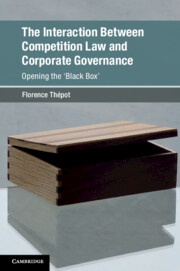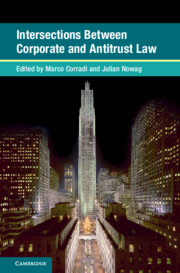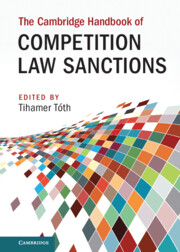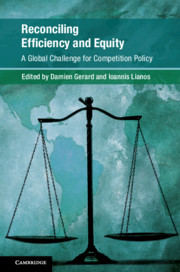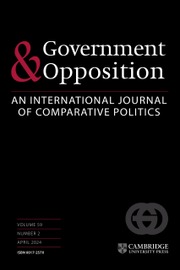The Interaction Between Competition Law and Corporate Governance
Opening the 'Black Box'
£23.99
Part of Global Competition Law and Economics Policy
- Author: Florence Thépot, University of Glasgow
- Date Published: May 2022
- availability: Available
- format: Paperback
- isbn: 9781108435420
£
23.99
Paperback
Other available formats:
Hardback, eBook
Looking for an inspection copy?
This title is not currently available on inspection
-
Florence Thépot provides the first systematic account of the interaction between competition law and corporate governance. She challenges the 'black box' conception of the firm- or 'undertaking' - in competition law, as applied to increasingly complex corporate relations. The book opens the 'black box' of the firm to understand the internal drivers of collusive behaviour, and proposes a unified approach to cartel enforcement, based on the agency theory. It explores key issues including corporate compliance programmes, the attribution of liability in corporate groups, and structural links between competitors, and should be read by anyone interested in how the evolution of the corporate landscape impacts competition law.
Read more- Provides the first systematic account of the interaction between competition law and corporate governance
- Develops a distinctive understanding of the ever-lasting cartel problem, as explained by individual and organizational factors
- Proposes a unified approach to the delicate question of liability in various types of economic relationships, such as within corporate groups, commercial agency agreements, and companies
Reviews & endorsements
'Overall, this is an appealing, well-structured monograph, which explains in an approachable manner a set of very complex and controversial problems that emerge when competition law scholarship searches for guidance from neighbouring areas, which know the internal mechanics of the corporate/institutional decision-making process better.' Oles Andriychuk, European Intellectual Property Review
Customer reviews
17th Oct 2024 by UName-456522
MEETING AT THE CROSSROADS: THE LINKAGES BETWEEN CORPORATE GOVERNANCE AND COMPETITION LAW An appreciation by Elizabeth Robson Taylor of Richmond Green Chambers and Phillip Taylor MBE, Head of Chambers and Reviews Editor, “The Barrister” Here’s an impressive work of legal scholarship for you, especially if you’re a lawyer — and certainly an academic — involved with corporate law. If so, the book will almost undoubtedly enrich your understanding and generally broaden your perspectives within this admittedly vast area of the law. Published recently by Cambridge University Press, ‘The Interaction Between Competition Law and Corporate Governance’ has been pinpointed as ‘the first systematic account’ of the ways and means by which competition law and corporate governance meet at the crossroads and actually interact, despite the fact that each discipline pursues different — and usually opposing objectives. The two entities, as author Florence Thepot points out — ‘constitute separate areas of academic enquiry across jurisdictions,’ as most commonly, they are often on opposites sides of the fence. Competition law, she asserts, is ‘oriented towards the defence of consumers’ interests, while 'the rules of corporate governance are designed to protect the interests of shareholders.’ While some will agree with this in its entirety, others may not. But it is unarguable that Thepot has constructed within this monograph, a convincing and minutely analytical argument to support this stance. Supported by an incredible amount of research, (as evidenced by the impressive twenty-page bibliography), this thesis has taken the author on a long and obviously enlightening journey, involving London (UCL), Washington D.C. (Georgetown), Strasbourg (BETA) and Munich (Max Planck Institute for Innovation and Competition) — plus the stimulating environment of the School of Law at the venerable Glasgow University — one of Scotland’s oldest — where the author now lectures. The book postulates several issues, affirming for example, that ‘the firm’, i.e. the corporate entity, should not manifest itself as a ‘black box’ to competition law. Attention here is focused on the ‘internal drivers of collusive behaviour’ within the firm and the proposition — to cite another example — that there should be ‘a unified approach to cartel enforcement.’ ‘This book,’ as the author reminds us, ‘is the first to discuss the issue of structural links from a systematic corporate governance and corporate law perspective’ alluding thereby, to the need to implement specific and possibly overdue reforms. Over the decades, there has been a lot of important scholarship on corporate social responsibility. This book is therefore to be commended for its up-to-the-minute and carefully researched approach to this and other key areas of concern within the broad arena of corporation law. This book reflects the law as at 31st May 2018 and was published on 14th February 2019.
Review was not posted due to profanity
×Product details
- Date Published: May 2022
- format: Paperback
- isbn: 9781108435420
- length: 315 pages
- dimensions: 228 x 151 x 18 mm
- weight: 0.46kg
- contains: 2 b/w illus. 1 table
- availability: Available
Table of Contents
1. Introduction
2. Theoretical foundations
Part I. The Conception of the Firm: Moving Boundaries:
3. The firm in competition law
4. The single entity doctrine in vertical relations
5. The single entity doctrine in horizontal relations
Part II. Opening the 'Black Box': The Case of Cartels:
6. Corporate governance insights into cartels
7. Cartel enforcement: sanctions and leniency
8. Cartel enforcement: corporate compliance programmes
9. Conclusion.
Sorry, this resource is locked
Please register or sign in to request access. If you are having problems accessing these resources please email [email protected]
Register Sign in» Proceed
You are now leaving the Cambridge University Press website. Your eBook purchase and download will be completed by our partner www.ebooks.com. Please see the permission section of the www.ebooks.com catalogue page for details of the print & copy limits on our eBooks.
Continue ×Are you sure you want to delete your account?
This cannot be undone.
Thank you for your feedback which will help us improve our service.
If you requested a response, we will make sure to get back to you shortly.
×
